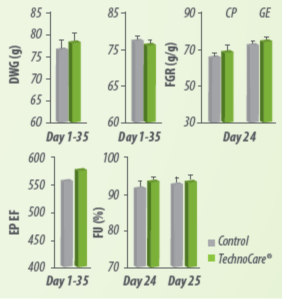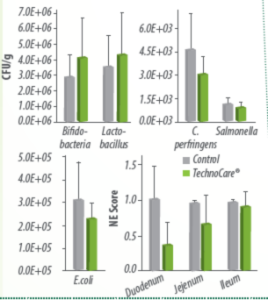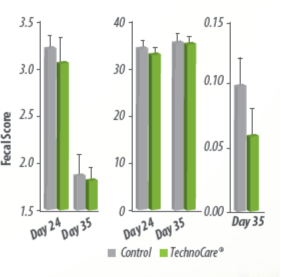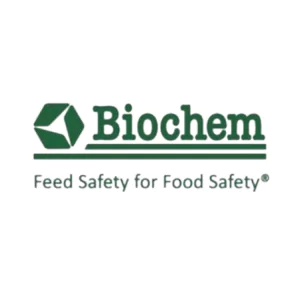Read more content on nutriNews International June 2024
Read more content on nutriNews International June 2024
| TechnoCare®200 is Biochem’s probiotic combination of two powerful bacterial strains, the multitalented lactic acid producer Bacillus coagulans DSM 32016 and Bacillus licheniformis DSM 33806, a specialist of C. perfringens inhibition. . |
![]() B. coagulans DSM 32016 has manifold features to enhance animal performance and support overall health. For example, this lactic acid-producing strain can comprehensively modulate the host-microbiota by inhibiting harmful gram-negative gut bacteria such as Escherichia coli while promoting health-beneficial bacteria such as Lactobacillus spp.
B. coagulans DSM 32016 has manifold features to enhance animal performance and support overall health. For example, this lactic acid-producing strain can comprehensively modulate the host-microbiota by inhibiting harmful gram-negative gut bacteria such as Escherichia coli while promoting health-beneficial bacteria such as Lactobacillus spp.
![]() Furthermore, immunological analyses demonstrated that B. coagulans DSM 32016 boosts the immune defense by enhancing animal IgA production.
Furthermore, immunological analyses demonstrated that B. coagulans DSM 32016 boosts the immune defense by enhancing animal IgA production.
| B. licheniformis DSM 33806 has the property to directly suppress harmful gram-positive gut bacteria such as Clostridium perfringens. In this regard, it has been scientifically proven that TechnoCare® reliably lowers the risk of intestinal disturbances and associated serious diseases, including necrotic enteritis in poultry. |
| TechnoCare® can be used in premixes, mash, and pelleted feed and is compatible with other feed additives such as organic acids and coccidiostats. |
TechnoCare200®: The Ace for Poultry Health and Performance
The positive impact of TechnoCare®200 on performance and different health parameters was tested in one day old broiler chickens (Abor Acres, Thailand 2021).
![]() The control group was fed a diet without TechnoCare®200, whereas the other group received the same diet but containing TechnoCare®200.
The control group was fed a diet without TechnoCare®200, whereas the other group received the same diet but containing TechnoCare®200.
In comparison to the control group, TechnoCare®200 successfully improved animal performance, including a +2% higher daily body weight gain (BWG) and a significant -1.4% reduction of the feed conversion ratio (FCR) (Figure 1).
The improved feed conversion was reinforced by an increased feed digestion. Broilers fed with TechnoCare®200 showed a +4% improvement of crude protein (CP) digestibility and were able to extract +3% more energy (GE) from ingested feed (Figure 1).
As result, broilers fed with TechnoCare®200 showed a +4% better European production efficiency factor (Figure 1), although no differences in livability were observed. Furthermore, TechnoCare®200 significantly improved flock uniformity (FU) by up to +1.9 % (Figure 1), an important parameter when it comes to optimizing feed formulation or carcass processing and final sales.

Figure 1. Effect of TechnoCare®200 on performance,
digestibility, production efficiency, and flock uniformity.
DWG, daily weight gain; FCR, feed conversion ratio; CP,
crude protein; GE, gross energy; EPEF, European production
efficiency factor; FU, flock uniformity. *, p ≤ 0.05.
Improved performance and feed conversion is strongly associated with intestinal health including an efficient gut microbiota as key factor. Microbiological analysis of fecal samples at day 35 demonstrated the microbiota-modulating properties of TechnoCare®200.
The supplementation of the probiotic led to an increase of health–beneficial bacteria such as Bifidobacteria(+43%) and Lactobacillus(+23%), whereas harmful bacteria such as E. coli(-26%), C. perfringens(-34%), and Salmonella (-19%) were clearly reduced in feces of the broilers fed with TechnoCare®200.
These data were reinforced by the health status of the intestinal epithelium determined by necrotic enteritis (NE) scoring. In the first section of the small intestine, the duodenum, the dual-strain probiotic was able to significantly reduce necrotic appearance by -64% and thus improved gut integrity (Figure 2).
Also, other gut sections of broilers fed TechnoCare®200 had a better health status (Jejunum [-3 %] and Ileum [-6%]).

Figure 2. Effect of TechnoCare®200 on intestinal microbial balance and NE Scoring. Ileal digesta was used for bacterial analysis. NE Scoring: 0 = No lesions; 1 = Thin intestinal wall; 2 = Few areas of necrosis; 3 = Moderate to severe necrosis; 4 = Fibrinous necrotic debris. *, p ≤ 0.05
Improved intestinal health and digestibility have also the potential to improve fecal consistency, thus enhancing litter quality and foot health. Related data indicated, independent of the sampling time (day 24 [-5%] or day 35 [-3%]), a better fecal score in birds that were fed TechnoCare®200 (Figure 3).
Likewise, the moisture content of the litter was reduced by -3% and -1% at day 24 and day 35, respectively (Figure 3). The collective results suggest an improved litter quality which is known to support foot health of birds and lowers the occurrence of painful foot pad lesions. Indeed, although none of the birds had severe foot pad lesions, initial discolorations were significantly less observed (-40%) at feet of broilers fed with TechnoCare®200 (Figure 3).

Figure 3. Effect of TechnoCare®200 on fecal consistency,
litter moisture and foot health. Fecal Scoring: 1 = Hard and
dry; 2 = Firm and formed; 3 = Soft and moist; 4 = Soft and
unformed; 5 = Watery liquid. Lesion Scoring: 0 = smooth,
no lesion; 1 = very small and superficial lesion with slight
discoloration over small surface. *, p ≤ 0.05.
Conclusions
A healthy, productive livestock animal starts with taking care of its insides, the intestinal tract. TechnoCare® specially developed by Biochem is doing just that. The collective findings indicate the multifaceted beneficial properties of TechnoCare®200 with positive effects on:
This dual-strain probiotic is not only a reliable and well-proven environmentally friendly alternative to antibiotic growth promoters, but also suitable to maintain farm profitability in challenging times by taking care of your animals’ health and welfare.

Learn more at biochem.net
You may also like to read: “BronchoVest – The Great Ally for Respiratory Relief & Heat Stress Reduction”
MORE CONTENTS Biochem International